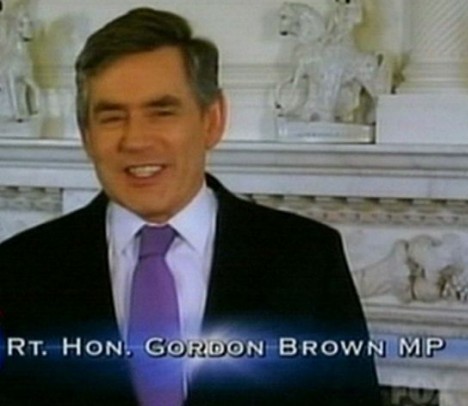A brief history of recent elections leading to the collective stupidity of 2017: a gibbering imbecility about to be repeated
If most people vote in British general elections, where the outcome time after time is a steady progress to the same destination irrespective of which party is in office, because they think their political team is different from another, then by rights most people should not be allowed anywhere near a ballot box on psychiatric grounds. As it is, UK Government actively encourages mass states of psychosis so that, out of fear of the “other”, as many people contract with it as possible: in other words, cast a vote. The great irony of this situation is that only those who see through the interminable manipulation are fit to vote – and they don’t vote precisely because they can see the disempowerment (with no return to be had) that the act entails. It is only when one doesn’t contract with Government that one is not bound to accept its rule† or, in other words, its legislation (which potentially, at its logical conclusion [because it is for pursuing a political agenda], is “one rule for us, and another rule for them” – but please see the FBEL article, The police as militia, and the “policing by consent” deception, for more on this).
While there is a good constitutional case for not voting based on the fundamental priority of individual liberty in the face of the abusive state, it might just be more effective, in the hope that people have more self-respect than to allow themselves to have their trousers pulled down every four or five years, to appeal to the idea of the vote as a contract to a scheme whereby the voter is always a mug being confidence-tricked.
The basic methodology of the scam has been explained hereabouts before – and the reader is referred to what should prove an interesting article, Just when you thought it was safe to go back in the voting booth, which explains the meaning of the film Jaws at the same time:
And all the while a particular party is to remain in office, the other, which will therefore be in opposition, is demonised to dissuade the electorate from voting for it (although the Government can always cheat if there is any real chance of this happening). If, on the other hand, the opposition needs to be brought into office, it is the incumbent party that suffers the very rough treatment of the organised corporate-media, and suffered to be made to look incompetent and plain nasty to the thoroughly deceived voter. The reader is invited to think of a time when there wasn’t a change of party in office when the incumbent wasn’t in disarray.
The last line of the extract is particularly pertinent as we now cast our minds back to the time approaching the 2010 election when Labour, the party in office, was in disarray. Gordon Brown had been Prime Minister since 2007; apparently he had had a turn promised to him and Blair had become vastly too hated to prevent it from happening.
By then, though, there had been years of the worst kind of Soviet-style separation between facts found on the ground and dictated by government, and Brown’s gurning and make-up caked appearance on American Idol, happening not long into his term in office, represented the scale of the Labour executive’s desperation to appeal.
At the 2010 election, Labour was on a point of melt down that it would have had in office if it only was allowed to continue there. The next election would have then ravaged the party, and there is no telling how long it would have taken to recover. More importantly, if Labour had won the 2010 election then David Cameron, the self-styled “heir to Blair”, would certainly not have continued as Tory leader, having been unable to unseat a man who had been ensconced dubiously in power like a Caesar who the Romans had had up to their eye balls and could no longer tolerate. If voters had not been manipulated through their over developed fear of the other, a political phase (which we could call Blairism, although we still live in it today) would have suffered an enormous set back in 2010.
Of course, what Government did, through its media mouthpieces, was exacerbate the fear of the continuing Labour executive, when there should not have been any: that the electorate is never able to take a long-view perspective beyond the current political terror is always to its distinct disadvantage. The fear of Labour was supposed to prevent support for UKIP, which is the only effective force for leaving the EU that has ever existed in British politics. If voters had the courage to let the chips fall where they may in 2010, UKIP may have been in a position whereby the Tory party, going into the following election as opposition, would have had to fashion itself in such a way that not only would it promise to hold the EU referendum, but also actually campaign for a Leave result.
As it was, in any case, UKIP’s being in the arena in 2010 was invaluable, because it caused the coalition between the Tories and the Lib Dems, and caused the illusion of political faction at Westminster to be destroyed. The coalition was a revelation of the method: a demonstration of the reality of the progressive consensus, and the priority for a Government (that obviously puppeteered the parties) of the upholding of an agenda that remained the same from one executive to another. Moreover, that there was not a cigarette paper to be inserted between the LibLabCon drove support to UKIP during the 2010 to 2015 parliament, and ultimately it’s why Corbyn was installed as Labour leader – but we’ll come to that momentarily. More immediately, the rise of UKIP in 2010 caused Government to concentrate its mind on the long-standing grievance that a majority of Britons had with their country’s EU membership. The referendum on the issue was conceived in the time of the Cameron-Clegg executive in order to kill the matter off once and for all.
Come the 2015 election and, as it was stated at the time at FBEL, things only improved for “the force in British politics that will prove most effective at mobilising the electorate to vote out [or Leave, as it transpired]”. The Tories may have had a promise of a referendum in their manifesto, but they also had a policy of preferring reform of the EU ahead of any exit; as such, they could not win much more support than had been found in 2010. The big difference was the collapse of the Lib Dems – on the face of it, punishment for collaborating with the Tories in the coalition – from whence support went in all directions; even to UKIP. UKIP turned into a major menace, with voter numbers now in terms of millions. And this was in spite of a campaign of fear to promote the danger of a Labour-SNP coalition, and the subsequent necessary importance of electing the Tories, again to mitigate the surge of UKIP.
At the time, the author thought it might be possible that a good deal of the British public had got beyond the reach of the fear of the “other” propaganda and manipulation. And it seemed entirely appropriate that this fundamental quality of individual character, menacing to Government in itself, could produce a threat in terms of pooled sovereignty: UKIP. That UKIP was a threat (unlike the Brexit Party, which is not) was easily discernable from media coverage. In April 2015, to dissuade support for it, the corporate-media was complaining about UKIP’s far-rightism, its racism (both unjustified smears) and how it undeservedly had prominence in news coverage. In the end, the Government couldn’t have things both ways: if UKIP had to be stigmatised because it was too popular, there was no hiding it under a bushel. No wonder, then, in April 2015 that YouGov published an article based on its findings that “Voters still think media are most biased against UKIP”. The fact that UKIP has produced a costed manifesto was reflected in the attacks on it, with Channel 4 News fact checking if UKIP did indeed have the “most credible manifesto”.
When one looks at the coverage of the Brexit Party a month before the 2019 general election compared with that of UKIP’s in 2015, it is like chalk to cheese. Chiefly, for the most part, the Brexit Party is mentioned in relation to its effect on Tory election success: it is being used as a bogeyman to elicit participation in the election in that respect. Of course, not being a serious political party, and thus only having a number of talking points (called policy) designed to convey its supposed anti-establishment credentials, the corporate-media cannot attack the Brexit Party on its manifesto. If one was to look at the exposure that the Brexit Party gets, one might forget that at one time in its life, UKIP could only get a mention on British television when Russia Today would interview the party’s MEPs. Naturally, the Brexit Party does not get abused with constant accusations of being of the far-right, or racist, because not only does Government want people to know about the Brexit Party, it wants people to vote for it too. That the Brexit Party is controlled opposition should be plainly evident.
By the time of the general election of 2017, there had been a surprise change with the Labour party so that Jeremy Corbyn was at the helm. As much as his cult following likes to excuse the big disappointment he must have since been to them by blaming others around him, FBEL soon had this fellow sussed as another deployment by which Government could generate those votes-as-contract with it; he was installed in an effort to put clear water between the LibLabCon parties. The following appeared in February 2017:
Jeremy Corbyn is for two purposes. Firstly, he appeals to people who have voted Labour and who detect the dead hand of the British Government of and for corporate globalism. These people think that Corbyn is an anti-Establishment revolutionary – a reaction to the Blair corporatism – rather than the Government tool he clearly is. Corbyn demonstrated a disqualifying lack of integrity when he discarded, what we were told were, deeply-held personal convictions regarding opposition to the EU, to oversee an official Labour Remain stance during the referendum on EU membership. But in spite of this, the hoodwink suffers not, and so certain Labour voters won’t abandon the Labour party for UKIP because of Corbyn. On the other hand, Corbyn is the bogeyman that drives would-be UKIP voters to the Tories; the motivation is panic brought on by fear that a party with his demonised-self would rule the country. It’s an age old tactic.
The 2017 general election was termed the “Day of the Dumb” at FBEL because the electorate proved not to be very savvy after all. In fact, it was downright and disastrously stupid. It had been worked upon as if it were children scared by tales of monsters under the bed. The 2017 election was the end of the ballot box as a means to creating change (if it ever had existed), because it made UKIP into the insubstantial thing that the Government always wanted people to believe it was (and then the final death blow came when Gerard Batten made UKIP fit the racist profile that the Government had always wanted people to believe it had had). UKIP was years in the making, and that the Brexit Party can pop up out of nowhere when it is needed (by Government) is indication in itself that something is not right with it.
Perhaps making it more of a tragic event was the fact that there was no good reason for a general election in 2017. The Tories had had a majority in the Commons, albeit by four seats, but after the election they were nine seats short and relying on the DUP and a confidence and supply deal. The election clearly was had to hamstring the executive’s ability to obtain the Brexit that it knew people were expecting – and of course it was for finally killing UKIP. In 2015, UKIP had finished second in 120 seats, and 44 of these were behind Labour. However, in 2017 the Tories would not stand down their candidates in those places, because there was no desire to see UKIP having any sway in the shenanigans that have gone on in the Commons since. Worse still, the Tories would try to elect, ahead of the UKIP ones, candidates who would publically endorse the abomination of a Withdrawal Agreement that Theresa May was owner of at the time (as covered in FBEL’s The Tory Fake Brexit Candidates series, parts one and two).
It was clear at that election that a vote for the Tories would create a pig’s ear in terms of Brexit – but people voted Conservative irrespective of this, because people mainly voted out of fear of Labour. Whether or not such people now understand that their vote didn’t save Brexit as they thought they had been promised is not at all clear, given the fact that they are about to make the very same mistake again. In 2017, when they elected the Tory executive, and empowered the Labour opposition, they merely gave the UK Government free rein to disarm the 2016 referendum. It truly was the Day of the Dumb, and the biggest sense of ignominy should be felt by those who voted for a Tory in the name of Brexit in a seat where UKIP had finished second in 2015. These people were so short sighted that they couldn’t even see that, if they promoted their UKIP candidate from second to first position, they could place an anchor for Brexit into Parliament around which opposition to the Tories from rebels in all parties could coalesce. If they placed enough of them, then the Tories would be relying on a confidence and supply deal with UKIP as well as the DUP. Instead they succumbed to the generic fear mongering without a thought about their particular situation. Let there be no doubt, when the Brexit leaving dates expired multiple times in 2019 without Britain leaving the EU, it was the fault of the Dumb of 2017.
As in 2017, in 2019 Brexit will not be saved by a Tory executive (now touted to win by a 96 seat majority). It’s been clear from 2016, to anyone who bothered to look into it, that the Tories have never been interested in delivering Britain into a state of independence from the EU. While a lot of people do realise this, they still do not appreciate that there is nothing to be done about it through the ballot box, because this time around there isn’t a real opposition to turn to. No matter, because the fear of the other can be generated by the prospect of the ever-so timely Brexit Party in the context of a “Unite to Remain”‡ (a scheme for tactical voting, the reader might notice, hastily conjured only a matter of days after an FBEL article noticed that no such thing existed, and stated that there was no threat to a Tory win), even if the opinion polls would suggest Labour as being dead in the water.
Moreover, the author suspects that a lot of support for the Brexit Party is from people who regret their stupidity in 2017: they want to resurrect a stumbling block to the UK Government that they themselves helped vanquish. However, these people are fighting the previous election that was already lost, and they would do better to come to terms with the new situation, or else go through life arriving at every election hereafter trying to make good on the mistake they inevitably made the last time. The national election ballot box as a solution is over – and in fact, the Government knows it too, but is looking to prevent widespread appreciation.
The reason that we know that UK Government is cognisant of its terrible problem is because at the start of his premiership, Boris Johnson addressed the issue of restoring faith in British politics – which, as pointed out previously hereabouts, actually involves people being “restored into a state of having unflinching tolerance for the lying – which extends to believing that the democratic system empowers them.”
The Brexit Party is a device to delay fuller loss of faith in British politics, and it is nothing other than that. The matter of it being a particularly cynical version of controlled opposition has been covered aplenty before at FBEL, so no need to go over that old ground again (instead please follow the links at the foot of the article). What is important to stress at this juncture is that it would be futile to vote for the Brexit Party. One doesn’t have to be Matthew Goodwin, professor of politics at Kent University, to know that the Brexit Party isn’t going to win a single seat – and this is ultimately why the reader has been reminded of UKIP’s recent history. The Brexit Party doesn’t have the infrastructure that UKIP did. It doesn’t have a record of 120 second places in the previous general election. If UKIP could be squashed by election psychosis, then the Brexit Party will be turned inside out.
Of course, this message would not appeal, nor would it be aimed at Conservatroids – those people who reflexively, as if robots, vote for the Tories at an election – nor Corbynist cultists who will vote Labour because of their anti-Tory programming – and nor to Blairists who might well happily vote Tory this time. However, there are a good deal of would-be Labour and Conservative voters who want a proper Brexit. These people should know that, with a vote for the Brexit Party being a futile gesture (except that Government has motivated a voter to contract with it), and with there no longer being a viable UKIP option, voting for their old parties will be to endorse the coming Tory Withdrawal Bill. The bottom line is this: anyone who wants proper Brexit should not vote in the 2019 general election so as not to endorse the Fake Brexit that will be enacted when Boris Johnson is returned as prime minister – and if the reader does not like this bottom line, don’t hate the messenger. The author wasn’t one of the dumb in the Day of the Dumb, and didn’t participate in the greatest collective error that Britons have ever committed.
† Imagine what could happen if communities of thousands of people rejected unjust UK Government rule and were able to lawfully defy its enforcers of legislation, and were able to deny them access to huge tracts of territory wherein sovereign individuals could be protected from the state. It would mean the creation of a rival power base whereby, eventually, the Parliament at Westminster could be made redundant. Certainly, this sort of idea might be a pipe dream, but the one sure thing that can be said about it is that it will never be realised if individuals will not even take the very simple first step towards it: not voting.
‡ In the end, it doesn’t matter if the Lib Dems and Plaid Cymru and the Green Party form an election alliance and win enough seats to block the Tories’ Brexit – because the Tories’ Brexit is fake. In fact, the 2019 Brecon and Radnorshire by-election showed that this alliance cannot muster numbers in support whereby any win could be said to be convincing or representative of the people living in the affected constituencies. Any such victories could only serve as prime examples of how the British Parliamentary system creates power for itself illegitimately. The UK Government should hope that none come about.
Boycotting the European elections: there can be no business as usual after Fake Brexit (link)
EU elections candidate asks: Why is Farage all over the airwaves while my party is ignored?; answer: the Brexit Party is an operation (link)
Brexit Party (versus the Lib Dems) as new device in continuing project to obtain Fake Brexit (link)
It’s Brexit Party snakeoil, however the stars align: the conjunction of Bilderberg, Trump and Peterborough (link)
Brexit Party fulfils its primary role after all: by-election turnout improves at Peterborough (link)
The Brexit Party, and the business of being on the gravy train in the name of being against that sort of thing (link)
UK Government is going to install a Fake Brexit enacting Tory executive; don’t rubberstamp it by voting (link)



















